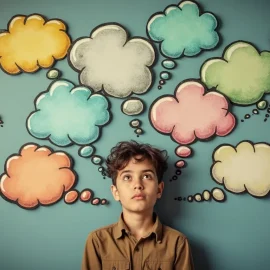

This article gives you a glimpse of what you can learn with Shortform. Shortform has the world’s best guides to 1000+ nonfiction books, plus other resources to help you accelerate your learning.
Want to learn faster and get smarter? Sign up for a free trial here .
Why do people tend to copy what others do? What are the negative effects of peer pressure?
As a social species, humans often rely on the opinions and directions of others to feel accepted. Sometimes, peer pressure can have a positive effect on people, but there are instances where peer pressure can cause bad habits or hurt someone’s mental health.
We’ll first look at why people want to conform, and then we’ll explain the negative effects of peer pressure and how to overcome them.
Why People Give Into Peer Pressure
Whether we like it or not, The Willpower Instinct by Kelly McGonigal says both good habits and bad habits spread within social and family circles. Our brains have specialized cells, called mirror neurons, that keep track of what others around us do, say, think, feel, and want. When we see someone trip and fall, we wince and “feel their pain” for a moment. It’s because our mirror neurons are creating a theater in which a trip-and-fall play is unfolding, and for a moment, we’re starring in the play. It almost seems like it’s happening to us. Mirror neurons are the basis of our empathy instinct, which makes us understand other people’s feelings.
Our mirror neurons can respond to other’s pain and also to their emotions. This is also why television shows utilize laugh tracks—your mirror neurons will think the show is funnier because we hear other people laughing. But this mimicry of emotions also comes into play when we see others indulging. If you watch your spouse eat a giant bowl of ice cream because he or she has had a hard day, your brain starts craving a reward, too—even if you don’t particularly like ice cream. Your brain is empathizing with the emotional craving that’s occurring in his or her brain—“I had a hard day, so I deserve to eat something delicious.”
It’s also why if you go out to lunch with a friend who orders a glass of wine, you’re more likely to order a glass of wine, too—even if your willpower goal is no alcohol before 6 p.m.
The research: Studies have examined what happens in a smoker’s brain when they watch actors in movies smoke cigarettes. The regions of the brain that control hand movements actually light up—the brain is preparing the hands to pull out a cigarette and light up. Studies have also shown that gamblers will bet more money after seeing someone else win, and most of us will spend more money when shopping with others and eat more calories when eating with others.
The oddest part of this self-control epidemic is that it isn’t activity-specific. Any time we see people behaving badly—whether it’s breaking rules, disobeying laws, or just indulging in unhealthy habits—it increases our risk of giving in to peer pressure. If your friend cheats on their taxes, you may be more likely to cheat on an exam. If someone paints graffiti on your street, you may be more inclined to litter.
Are We All Lemmings?
It seems reasonable that our families and close friends influence our behavior, but we should also consider how much strangers influence our choices. For example, do you ever look to see what movies are popular or what the bestselling books are? Do you look at customer reviews for products you’re thinking about buying?
Our brains trust the tribe of humanity—we believe that what others enjoy must be good. The theory known as “social proof” sounds a lot like what your mother used to say: “Would you jump off a bridge just because your friends did?” Indeed you might. Humans are wired to do what others around them do.
“Everyone else is doing it” is one of the strongest marketing messages in the world (even though most of us believe it doesn’t apply to us). We may brag about our independent thinking, but the truth is that the human social instinct is overpowering—and our brains are wired to find a way to fit in, which means doing what others do and liking what others like.
The Downsides of Peer Pressure
Children, teens, and adults can all be potential victims of peer pressure. Children want to make friends on the playground, teens are influenced by peers at school or on the Internet, and adults feel the pressure at work or social gatherings. It’s natural for us to want to fit in, but the way we go about it isn’t always good, especially if it changes who we are as individuals.
Here are just four negative effects of peer pressure that you may experience if you’re trying to fit in.
1. Peer Pressure Makes You Lose a Sense of Judgment
According to Influence by Robert B. Cialdini, people who give in to peer pressure are more likely to lose their own sense of judgment because they decide what’s correct based on what other people think is correct. This is a concept he calls “Social Proof.” If lots of other people are doing something or thinking something, then it must be good and worthy of imitation. It’s why television producers add laugh tracks to unfunny sitcoms: they know that, through social proof, we’ll be more likely to laugh if we hear others laughing (even if we don’t find the content to be funny on its own).
Social proof can be faked, manufactured, or used for self-serving purposes by compliance practitioners to trick you into jumping on the bandwagon. It’s why so many product advertisements talk about being the “fastest-growing” or “highest-selling”: the marketers want to convince you that there’s a groundswell of demand for the product from others. Or even worse, they’ll create fake “person-on-the-street” commercials where allegedly “real” people (who are actually paid actors) talk up the merits of the product. These manufactured advertisements could trick you into joining something dangerous, even if they say it’s good for you. Smoking and fast food products are just two examples of many.
These manipulation tactics not only make you lose judgment but also your sense of self. Is there a reason to do something, beyond just the fact that everyone else is doing it? Don’t be like a pilot who flies by relying solely on her instruments. You also need to actually see the sky in front of you. Sometimes you do need to look critically at the world around you, take the time to assess situations, think for yourself, and apply your own individual judgment.
2. Peer Pressure Negatively Shifts Morals
In The Lucifer Effect, Philip Zimbardo explains that social pressures are a major circumstantial variable with the power to influence us to act immorally. When the people around us want us to do something evil, it becomes significantly more difficult for us to resist. These social pressures come in two main forms that often overlap: group pressure and authoritative pressure.
Group Pressure
Zimbardo asserts that we all have a basic need to feel accepted by those around us. For this reason, when we find ourselves in new situations, we observe those around us to determine what behavior is appropriate. In this way, our morals often shift to match those of the people around us.
Zimbardo notes that if we perceive a group to be prestigious and exclusive, the pressure it exerts on us is even more powerful. Our human need to belong becomes stronger when combined with our desire for status. For example, a schoolchild who wants to be accepted by the “cool kids” may make fun of kids they would normally be friends with.
Authoritative Pressure
Authoritative pressure is when an individual or group in power bids you to do something. Zimbardo asserts that, generally speaking, it’s far more likely that we will commit evil if we’re “just following orders.” While group pressure is indirect and sometimes accidental, authoritative pressure is a direct attempt to control your behavior.
Research has shown that we’re far more compliant with authority than we believe ourselves to be. To support this point, Zimbardo describes the most famous experiment on this subject: the Milgram experiment. In 1963, Yale professor Stanley Milgram ran this experiment: An assistant in an authoritative-looking lab coat ordered volunteers to administer increasingly severe shocks to a fellow volunteer for a study on memory. Unbeknownst to them, this second volunteer was an actor who would pretend to be in incrementally greater pain until they screamed in agony, begged the volunteer to stop, and finally pretended to lose consciousness.
A group of psychiatrists predicted that fewer than 1% of volunteers would follow orders and administer the most severe shock level, but in reality, 65% of people did. Milgram presented this as evidence of the extreme power of authoritative pressure.
3. Peer Pressure Makes People Gullible
Another negative effect of peer pressure is that it can make us believe almost anything, even something irrational. In games where people earn status by believing in an idea, then the belief itself becomes a status symbol. The people who have adopted the idea come to view it as a core part of their identity. An example is the theory that childhood vaccinations cause autism: Will Storr (The Status Game) describes how, when well-intentioned parents believe misinformation about vaccines and reject immunizations for their children, some become so invested in groups that spread anti-vaccination messages that these groups become core to their identity.
Storr explains that when a game becomes too conformist, it becomes something like a cult, a group that requires people to show complete obedience with their behaviors and their beliefs. In games that require conformity, players gain status by proving their dedication to the group’s belief. As people see others attaining status within the group, they join and adopt the belief, which becomes part of their identity. In this way, even extreme ideas grow in popularity.
4. Peer Pressure Can Increase Mental Health Issues
A negative effect of peer pressure is that, while you want to fit into a group, it also makes you want to be better than everyone else. Comparing yourself to others, says Brené Brown’s book The Gifts of Imperfection, can lead to a lack of self-worth and terrible mental health issues.
Comparison’s damage lies in the fact that it involves both competition and conformity. At first, this might seem counterintuitive. How can we both compete with others and strive to conform at the same time? Surely competing with others requires being different from them—specifically, being better?
Brown argues that competition and conformity do co-exist, and do so very destructively. They feed into each other when you want to be the “best” in your particular social or societal group—when you want to conform to that group’s standards, and do so “better” than everyone else. For example, if you live in a traditional suburb with broadly identical houses, you might want to become “better” than your neighbors by having the greenest lawn, the nicest yard, or the most desirable car. Another example is when a group enforces conformity so much that you feel pressured to prove that you’re better than outsiders.
When you allow comparison, competition, and conformity to take over, you lose sight of your inherent worthiness. You begin to base your self-worth on how well you match up against others—on how well you’re conforming. You think you’ll only be worthy if you meet certain standards of behavior. This is incompatible with the unconditional self-acceptance that underpins true worthiness.
If you fail to either conform or stand out, however, your sense of grandiosity turns into humiliation or a loss of pride and self-respect. The Status Game says that humiliation can result in poor mental health outcomes like depression, anxiety, and even suicidal ideation.
How to Use Peer Pressure to Your Advantage
Fortunately, peer pressure also works in a positive direction, The Willpower Instinct affirms. If your close friend quits smoking, you’re much more likely to quit smoking, too. Willpower—and the lack of it—is contagious. Hang out with the right people, and your willpower will increase; hang out with the wrong people, and you’ll give in to temptation more frequently.
It may sound like humans are merely lemmings, but our strong social instinct can be an advantage. Think about whether there’s someone in your social circle who has struggled with a willpower challenge and succeeded. It might serve you well to spend more time in their company.
It’s tough to be under the influence of others, but this can also help us boost our self-control and help us avoid the negative effects of peer pressure. If you imagine yourself being evaluated by others—especially people you admire—you may decide to make less impulsive choices. For example, if you know your eight-year-old wants you to quit smoking, imagine his disappointed face when he catches you sneaking a cigarette in the backyard. Or imagine how proud he will be to celebrate with you when you reach your first no-smoking anniversary.
Wrapping Up
Peer influence is powerful in children and adults. It can help you make good decisions, but it can also lead you to make bad ones. It’s your responsibility to not give in to social influence so you won’t have to experience the negative effects of peer pressure.
What are other negative effects of peer pressure that people should look out for? Let us know in the comments below!

Want to fast-track your learning? With Shortform, you’ll gain insights you won't find anywhere else .
Here's what you’ll get when you sign up for Shortform :
- Complicated ideas explained in simple and concise ways
- Smart analysis that connects what you’re reading to other key concepts
- Writing with zero fluff because we know how important your time is






